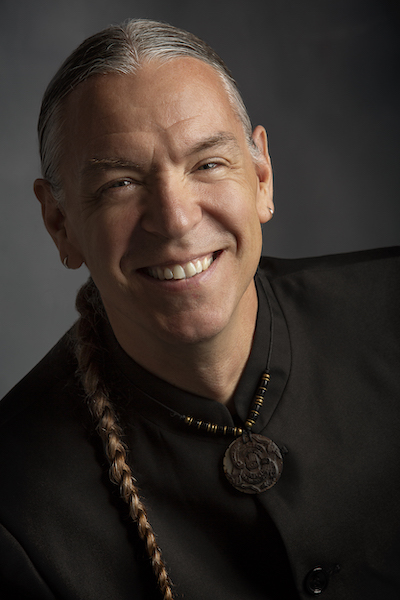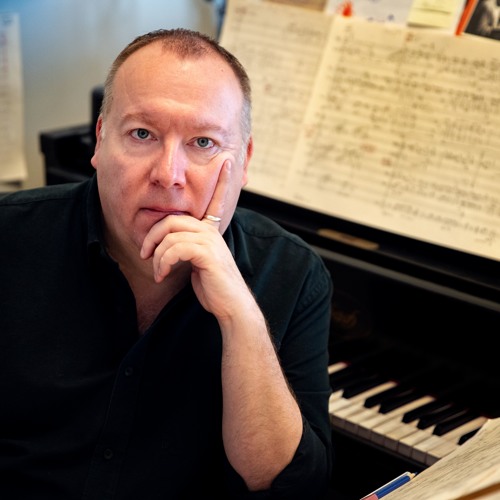by Jarrett Hoffman

“Jerod has been on my list for quite some time,” New Music Ensemble director Keith Fitch said in an interview. “He’s a really interesting composer who’s carved a fascinating career, and who is representative of a community of musicians we don’t often hear from.”
Music from opposite ends of Tate’s career will bookend the program on Sunday, October 31 at 4:00 pm in Mixon Hall. Talowa’ Hiloha (Thunder Song) for solo timpani was written in 1997 when he was at CIM, while MoonStrike for string quartet and narrator was premiered in 2019. The role of narrator, who recounts three American Indian legends, will be played in this case by Tate himself.
“Fortunately I’ve already had six performances of it since the premiere,” Tate said in a separate Zoom interview. “I just performed it in Tulsa — I’m going around and narrating for it, and I enjoy that.”
After discovering Talowa’ Hiloha (Thunder Song) on Tate’s website, Fitch knew he wanted it on the program, and he knew exactly where he wanted it. “I listened to it and I thought, ‘This is a really great opener for a program — a great opener.’”
“That’s one of my early works, and I’m actually quite proud of it,” Tate said, noting that he wrote it for his then-CIM colleague Alex Orfaly, who is now timpanist in the Stockton Symphony and former acting principal timpani of the San Francisco Symphony. “He was an undergraduate in Paul Yancich’s studio while I was a graduate student in the ‘90s, and now he’s a famous timpanist.”

Meanwhile, Michael Daugherty wrote Viola Zombie for Jeffrey Irvine and Lynne Ramsey, who both teach at CIM — and of course, the concert’s Halloween date was another point in the work’s favor.
Knowing that Tate wrote his timpani solo so early in his career, I was curious to ask him at what point things clicked in his mind to embrace his American Indian heritage as a composer.
That story begins with his parents. “Professionally, dad is in law, but he’s also the author of our current Chickasaw Constitution,” Tate said. “So I grew up with a large sense of politics and history within tribal cultures — my dad gave me a great cosmopolitan sense about being an American Indian.”
The composer’s father is also a classically trained baritone and pianist. “I grew up with dad singing and playing repertoire in the house — that’s how I started on the piano.” The younger Tate went on to major in piano performance at Northwestern University, and began at CIM as a piano major.
Then, thanks to his mother, composition entered the picture. “Mom is a professional choreographer and dancer, and she was doing a new ballet based on American Indian stories. She just turned to me and said, ‘Well, you’re my Chickasaw pianist — you can make my score.’”
The result was Tate’s first commission, and also a realization.
“Mom had literally asked me, in a very beautiful and innocent way, to be all of who I am at the same time,” Tate said. “I didn’t grow up thinking that my Chickasaw identity and my classical training on the piano would really have anything to do with each other, but mom gave me an opportunity in which those were being married.”
He pointed out how the repertoire he had studied on piano had trained him well when it came to the synthesis of artistry and cultural identity. “Debussy is hyper-French, Tchaikovsky is very Russian, Beethoven is extremely German — you can’t get more ethnically German than Beethoven.”
When Tate returned to CIM, having taken his second semester off to tour the ballet, he approached composition professor Donald Erb about adding a major in that department. “He did express skepticism, because he didn’t want me to overload with two majors. But I said, ‘We can do this one of two ways — I can either study with you and do it right, or I can compose anyway,’” Tate recalled with a laugh.
He noted the “unbelievable diversity in style and approach” of the studio, and how Erb could recognize each student’s individuality while still pushing them to be the best version of themselves that they could. Those philosophies have made a big impact on Tate’s own pedagogy.
“When I teach composition, I don’t have stylistic restrictions that I put on students. My job is to be their living encyclopedia on how to, and it’s critical that they receive quick, solid answers. I’m also basically their coach — ‘okay, you’ve got these ideas, now I’m going to put your feet to the fire and make sure that you are working as hard as you can, to be doing this at the highest artistry possible.’ Erb was just like that, and I’m so grateful for it. I still have friends from that studio, and I love the fact that we are all incredibly individual.”
Finally, we zoomed out from Erb’s studio to talk about the school in general. “My experience at CIM was nothing short of entirely transformative,” Tate said, pointing out the historic teachers and studios he came into contact with, and the classmates who have gone on to great success — many of whom are now his frequent collaborators.
“The colleagues that we build at our conservatories become our connections later on.”
Admission for Sunday’s program is free, but tickets are required. The concert will also be live-streamed here.
Published on ClevelandClassical.com October 27, 2021.
Click here for a printable copy of this article


